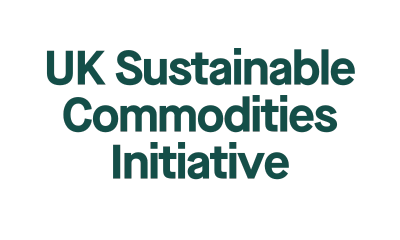UK Sustainable Commodities Initiative
Using the Accountability Framework to jump-start a major sustainability effort on forest-risk commodities in the UK
The UK Sustainable Commodities Initiative (UKSCI) convenes over 135 industry participants from across the supply chain. It includes major food and non-food trade associations, importers, manufacturers, wholesalers, and retailers to help drive a step change in company actions across forest-risk commodities in the UK.
The Initiative acts as a platform for direct public-private engagement between the UK government and industry actors, representing a significant share of UK business for the key commodities that drive the UK’s deforestation footprint. The overarching mission of the UKSCI is to develop sustainable and resilient UK commodity supply chains, whilst driving a positive global impact for people and planet.
The UKSCI consists of three support programmes: technical working groups, government policy dialogue, and private-industry partnerships, which act across a range of commodities including cattle, cocoa, coffee, palm oil, rubber, and soy. The UKSCI’s working groups focus on topics such as embedded soy in imported products, food service, living income within coffee supply chains, and oleochemicals.
Through these groups, industry works collaboratively to develop practical solutions to real supply chain challenges, such as aligned goal setting, supply chain management, and monitoring and verification. These solutions include developing tools and guidance (often drawing on the Accountability Framework), conducting research on subject of interest, or designing and deliver training, either internally or to other actors across supply chains. These learnings and outputs are then disseminated across the UKSCI industry network and beyond through the Sustainable Commodities Resource Hub.
The UKSCI uses the Accountability Framework definitions throughout its work. It also encourages its industry participants to use the Framework as a guide when writing policies, setting commitments (Accountability Framework Core Principles 1, 2, and 3), and creating time-bound action plans for achieving responsible supply chains (Core Principles 4, 5, and 6). The UKSCI also produces public, annual progress reports on the UK’s uptake of sustainable commodities, and encourages industry participants to report individually on their progress (Core Principles 11 and 12).
In addition, collaboration (Core Principle 10) between industry, government, and global supply chains is key to the UKSCI’s success. As the regulatory landscape continues to evolve, the UKSCI’s role as a bridge between industry and UK government is increasingly important. Through regular meetings, industry participants can provide input and engage in dialogue to support policy development. At the same time, government can better understand market developments impacting commodity supply chains. By sharing lessons and approaches, the UKSCI aims to support change in other markets, to stimulate action and identify opportunities for practical collaboration.
The UKSCI’s secretariat is Efeca, a member of the AFi Coalition. Efeca is a UK-based team of technical experts specialising in responsible sourcing, sustainable trade, and use of agricultural and forestry commodities. The UKSCI is supported by UK government via its Partnerships for Forests Programme.

